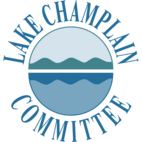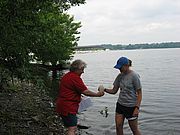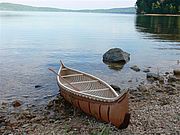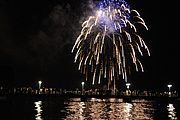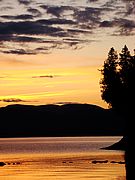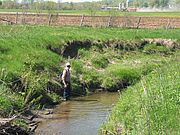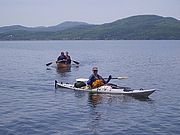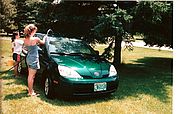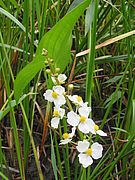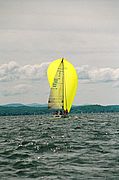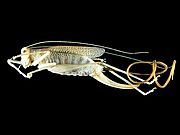LCC kicks off its seventh year of algae monitoring around Lake Champlain on July 6th. Water samples are taken weekly by volunteers around Lake Champlain and the results are analyzed by UVM’s Rubenstein Ecosystem Science Laboratory. LCC coordinates volunteer efforts and transports samples to UVM for analysis. Monitoring continues through the Labor Day holiday.
If you see algae blooms outside Missisquoi Bay, St. Albans Bay or the Alburg Passage, first check out LCC’s pamphlet on floating phenomena (pdf) and then contact us at lcc@ lakechamplaincommittee.org for guidance on collecting a sample for identification. Read...
As part of the Quadricentennial celebrations, a fleet of birch bark canoes will paddle to the Burlington waterfront on July 14, 2009, the exact anniversary of Champlain’s arrival to the lake. Paddlers are invited to accompany the canoeists in a flotilla of human-powered watercraft. Participants will muster at noon at Shelburne Bay and launch at 1 pm. The birch bark canoes will land in Burlington at 5 pm for a special ceremony. Please contact veteran boat-builder Douglas Brooks at 802 877-3289 if you’d like to join the event. There’s a $10 fee to participate but it’s free to watch. Read...
An impressive array of cultural and historic events have been unfolding this year as the region commemorates the 400th anniversary of Samuel de Champlain’s voyage to the lake. You’ll find more information on some of the programs scheduled at www.celebratechamplain.org and www.discoverlakechamplain400.org. The Quadricentennial is an opportunity to learn some history, recreate, and explore. It’s also a time to think about the lake’s future and how we can ensure it’s a healthy one. With that in mind, please consider celebrating the lake by taking LCC’s Lake Protection Pledge and committing to steps that will reduce your personal impact on water quality. Together we can create a clean lake! Read...
Learn more about the lake at these upcoming events
Explore the forces that shape Lake Champlain, the creatures that call it home, and how you can make a difference in its future at Main Street Landing’s Film House, 60 Lake Street in Burlington on July 6th at 7 pm. Click on the title above to see what we have lined up for the next few weeks or check out the LEARN section of our website for upcoming programs. Contact us at lcc@lakechamplaincommittee.org if you’d like to schedule an LCC presentation in your community. Read...
LCC along with the Vermont Agency of Natural Resources (ANR) has recently completed our third year of monitoring at a stream restoration site on Rugg Brook in St. Albans. Rugg Brook is an impaired waterway that flows into St. Albans Bay. An LCC assessment of the stream in 2005 revealed a section with steep eroding stream banks. ANR then partnered with landowners Andy and Nicole LaPierre, the town of St. Albans and LCC to flatten the banks and allow flood waters to dissipate over the surrounding lands rather than continuing to erode them and carry sediment to St. Albans Bay. LCC has remained active in assessing the success of the project.
Over the last three years the stream has settled into a well-defined channel, vegetation has re-established at the site, and planted willows are thriving. This is in stark contrast to the first year following construction when there was extensive disruption. Vegetation had not yet established and the stream thrashed about in its floodplain, cutting off meanders and creating new channels. Sometimes conditions need to get worse before they can improve. Monitoring will continue for two more years. Read...
The 2009 Quadricentennial edition of the Lake Champlain Paddlers’ Trail and Stewardship Manual is out! This year’s edition includes new site descriptions, revised maps and a special section on cultural history. Join or renew your membership at a level of $40 or more and we’ll mail you the informative guide to the Trail’s 37 locations that provide access to more than 700 campsites. Read...
Washing the car on a sunny weekend afternoon is part of the typical suburban summer scene. But usually the dirt, grime, detergents, and greases from the car end up in the local waterway and eventually Lake Champlain. Here are some tips to make your car washing more lake friendly:
- Use a commercial car wash - water from commercial washes is treated before reaching streams and less water is used overall.
- Wash over permeable surfaces like grass or gravel rather than in the driveway.
- Reduce excess use of water by using a trigger hose and bucket.
- Dispose of leftover water in the toilet.
For more lake friendly tips, check out the Learn and Get Involved sections of our website and consider taking our Lake Protection Pledge. Read...
On land plants have developed elaborate mechanisms to ensure pollen passes from male flowers to female flowers through wind or intermediate pollinators and thus ensuring reproduction; water presents a different challenge. Pollen can not move through water as it can through air and the reliable insect pollinators are much less abundant. Most aquatic plants compensate by holding their flowers above the surface of the water. Once pollination has been completed the stem holding the flower might coil as in water lilies, pulling the flower down below the water surface and out of sight from seed and fruit predators.
A few plants actually pass pollen through the water. One such species is coontail, a common native underwater plant sometimes mistaken for Eurasian water milfoil. In this species, male flowers break off of the plant and float to the surface. Once there they drop pollen which sinks down onto the female flowers which remain below water. Despite the fascinating strategies that some species have developed, vegetative growth from existing plant material is still the most common form of reproduction. Read...
Get out on the water and support great lake-related causes - including the Lake Champlain Committee - by participating in the 2009 Regatta for Lake Champlain! The event kicks off Friday, July 24th from 7:30 pm to midnight at the ECHO Science Center in Burlington, VT with a Lake Lovers' Dance Party. In addition to great entertainment, food and drink, there will be many door prizes and a silent auction featuring a 4 day/3 night vacation at Andros Beach Club in the Bahamas and lots more. Tickets for the lake benefit are $15/person, or $25/pair (21 years and up) and can be purchased at the door or in advance from http://www.regattaforlakechamplain.org.
The Regatta Sailing Race will be held on Saturday, July 25th, at 11:30 am just outside Burlington Harbor. Awards for this family-friendly pursuit-style race are given for placement in various classes, the Largest All-Family Crew, Last Boat, Youngest Crew, All Female Crew, Oldest Boat, and Middle of the Fleet. The boat that raises the most sponsorship money wins a special prize for the entire crew. The "pursuit" race has a staggered start to eliminate the stress and jockeying of a traditional race. Participating boats are given a handicap based on the length of the course and the speed potential of the boat. Smaller boats start first. The appeal of the race is that it brings all the classes of boats to the finish line around the same time making for a fun and exciting conclusion! The Regatta is open to racer, cruiser, or daysailor sailboats. For pre-race party and race entry details, prize and award information, or to sign up a crew or sponsor a boat, go to www.RegattaForLakeChamplain.org.
Since 2004 the Regatta has raised over $40,000 for lake causes. Over $10,000 has been donated to the Lake Champlain Committee to support our water quality protection and lake access work. Read...
“For most creatures being parasitized is a way of life” writes Annie Dillard in A Pilgrim at Tinker Creek. She later notes that an estimated ten percent of the world’s animal species are parasites. Lake Champlain is not immune.
Parasites, by definition, have an extended relationship with their host during which time they feed from the host, but in most cases they do not kill the host. Under this definition, mosquitoes or black flies do not count as parasites because they have a fleeting relationship with their food source. Of course, the exact line between an “extended relationship” and a “fleeting relationship” is fuzzy.
Most studies of parasites in freshwater systems focus on those that affect fish. Wildlife ecologist David Marcogliese estimates there are over 700 known parasites of Canadian fish, not including bacteria and viruses. The numbers for Lake Champlain are probably not much lower. These range from the very large and well-known sea lamprey to more cryptic mussels, worms, and fungi. Click on the title to read the complete article.
Read...
